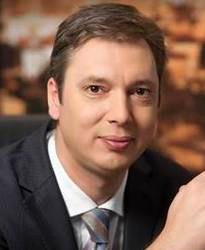GRAND OPENING: The Future of Albanian-Serbian Relations and the Stability of South East Europe
Discussion Points:
- Albania and Serbia: substantial or superficial cooperation?
- What is the way forward for Albanian-Serbian relations?
- Why are the Albanian-Serbian relations important for the stability of South East European region?
- Which areas of cooperation are offering the most potential for improving the relations between two countries?
- What is the role of civil society in promoting, advocating and monitoring the progress in Albanian-Serbian relations?
- What is the most effective and efficient path towards combating mutual prejudices and overcoming the existing stereotypes about the ‘other’ among citizens in Albania and Serbia?
- Uninterested, unsupported or restrained: what is keeping the media in Serbia and Albania from taking a more proactive role in improving the relations between the two countries and mutual perspective of their citizens?
Speakers:
Aleksandar Vučić‚ Prime Minister of the Republic of Serbia
Edi Rama‚ Prime Minister of the Republic of Albania
Chair: Misha Glenny‚ Visiting Professor, Harriman Institute, Columbia University
Background
After years of stalled cooperation, it seems that a time of renaissance has arrived in the relation between Albania and Serbia. Over the last few years, various initiatives and projects have emerged firstly from the sphere of civil society and then from the states themselves, with the aim to improve the cooperation of the two countries and the relations between their citizens. The history of relations of these countries is characterized by a frozen, distant and, at times, tense relationship. Today, the strategic importance of bilateral cooperation, mutual understanding and support between Serbia and Albania for the stability of the Western Balkan countries and their advancement in the European integration process has become widely acknowledged by political elites of these countries, as well as by the European Union (EU) itself. However, the question is whether the progress in Albania-Serbia relations is a superficial response to the newly fashionable topic, placed in the spotlight by the EU, or a path towards a substantial and constant improvement?
In addition to the topic of Kosovo, among the main obstacles hampering the development of fruitful relations between Serbia and Albania are the lack of knowledge about the other and the lack of chances for more intensive contact and cooperation in different fields, from economic cooperation and trade, to the joint initiatives and projects in the fields of tourism, culture, media, education and youth. A recent public opinion analysis revealed that the citizens in both Serbia and Albania still unequivocally value the normalization and improvement of relations between their states, finding them invaluable both from the aspect of regional and international relations, and the countries’ positions in foreign policy. Nevertheless, the long-lasting lack of knowledge and opportunities for close contact and joint cooperation resulted with widely spread prejudices and stereotypes that are still deeply rooted in the mutual perceptions of their citizens. The prejudices and negative stereotypes are frequently being reproduced among young generations through biased and often incorrect history teaching in both Albanian and Serbian textbooks. These obstacles have to be surmounted in order to ensure continuous and substantial of these two countries, regardless of the preferences of political elites in both countries, or pressure by EU and international community currently focused on this ‘hot topic’. The question is how? What is the most efficient and effective way to increase the knowledge about the other, bolster mutual understanding, and improve the relations of the two societies?
The civil society in both countries with various joint projects and initiatives has already demonstrated that cooperation is possible and underlined the potentials and benefits of its expansion. However, the examples of good practice often remained unnoticed by both high officials, and even more importantly – by the media of both countries. Quite contrary, most of the media coverage dealing on topic of Serbia in Albania, Albania in Serbia, as well as their mutual relations, is still focusing on the negative examples such as the infamous “drone incident”, consequently fueling the already widespread prejudices. On the other hand, the average life stories, or pieces illustrating the culture, science or lifestyle of its citizens, that can bring the citizens closer, are still rarely found. A more proactive role of the media in improving the Albanian-Serbian relations is certainly crucial, however the question arising is why it is lacking so far and what is the best way to improve it?
The ongoing support of the EU and its member states for the improvement of Albania-Serbia relations, sometimes even perceived as pressure, has certainly significantly contributed to the shifts in the policy of these states and the achievements made so far. Albanian-Serbian relations have particularly benefitted from the so-called “Berlin process” initiative and the Western Balkans summits organized so far in Berlin, Vienna and Paris. They have placed the relations of these two Western Balkan countries into spotlight, and bolstered their reviving after years of mutual ignorance by asserting their importance for the wider stability of the region. However, the ownership in this process has to be (re)located in Albania and Serbia in order to preserve the positive momentum initiated in the frame of the EU integration process and ensure substantial and constant improvement, for the benefit of their citizens, the Western Balkans and Europe itself.
—————————————————
Selected Readings:
- The Western Balkans’ Berlin process: A new impulse for regional cooperation (Briefing by Velina Lilyanova, European Parliament Think Tank, July 2016).
- The Limitations of Regional Cooperation (Paper by Jovan Teokarević in: Challenges of Serbia’s Foreign Policy: collection of papers, ed. by Jelica Minić, European Movement in Serbia and Friedrich Ebert Foundation, Belgrade 2015).
- Citizens’ attitudes on Albania and Albanians and perception of relations Between peoples and states (Results of the public opinion poll conducted in Serbia by the European Movement in Serbia and Friedrich Ebert Foundation, October 2015).
- Albania-Serbia Relations in the Eyes of the Albanian Public 2015 (By Alba Cela, Albanian Institute for International Studies and Friedrich Ebert Stiftung, Tirana 2015).
- Western Balkans and the EU: Beyond the Autopilot Mode (Policy Brief by M. Kmezić and F. Bieber, Balkans in Europe Policy Advisory Group, September 2015).
- Removing obstacles to EU accession: Bilateral disputes in the Western Balkans (Policy Brief by N. Dimitrov, M. Djolai, and N. Wunsch, Balkans in Europe Policy Advisory Group, September 2015).
- Albania and Serbia: Perceptions and Reality (Publication by F. Ejdus, A. Balla and M. Llubani, Albanian Institute for International Studies and Belgrade Centre for Security Policy, October 2013).
- Pavlović, A., Zaharijavić, A., Pudar Draško, G. i Halili, R. (2015) Figura neprijatelja: Preosmišljavanje srpsko-albanskih odnosa. Beograd: Institut za filozofiju i društvenu teoriju Univerziteta u Beogradu i KPZ Beton.
Previous BSF Panels and Sessions on the topics of Albanian-Serbian Relations and the Stability of South East Europe:
2015 – The Berlin Process in Belgrade: The EU as a Peace Project Revisited in the Western Balkans
2014 – Evening Panel: Serbs and Albanians in 2025 as Friends and Allies: How do We Get There?
2013
Session 3: Regional Cooperation and Reconciliation in the Western Balkans: Continuation or Stalemate
Useful websites:
- Serbian Ministry of Foreign Affairs – Bilateral Issues with Albania
- Albanian Ministry of Foreign Affairs – Regional Policy of Albania
- European Western Balkans – Berlin Process
- European Movement in Serbia – Joint Center on Albanian-Serbian Relations
- French Ministry of Foreign Affairs – Western Balkans 2016 Paris Summit
- Austrian Federal Ministry for European and International Affairs – Western Balkans Summit Vienna 2015
- German Federal Foreign Office – Western Balkans Conference Berlin 2014
- European Union External Actions Service – EU relations with the Western Balkans



